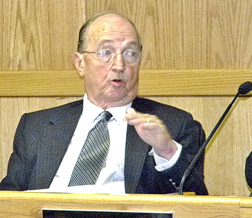HIGH SPRINGS- Right after swearing in two new commissioners, the High Springs city commission was all business at Thursday’s meeting, working to find opportunities for growth in the area. They discussed possibilities for the sewer system, Poe Springs management and a culinary school.
Sewer Line
With the city possibly losing $1.6 million for the expansion of the sewer system, the commission discussed the option of joining with Alachua to use their pre-existing sewer plant.
In a letter received Oct. 24, United States Department of Agriculture Area Director R.C. Quainton II informed the city that it plans to de-obligate, or take back, money granted in 2005 for the second and third phases of the High Springs’ sewage system. While the project was originally assessed at a cost of $10 million, the expansion actually cost about $8 million.
The city also failed to spend the money within the required five year time period. High Springs plans to file an appeal with the USDA to try to retain the money.
The commission decided to meet with the city of Alachua to see if connecting to their sewer system is a viable option. A pipe would be run down Highway 441 or State Road 235 to Alachua’s wastewater facility.
“It’s a great alternative, should we lose the $1.6 million,” Vice Mayor Bob Barnas said. “For half the cost, we would be able to service the east side of the city and resolve the issue we have with capacity.”
He agreed to arrange a preliminary meeting with the staff of the city of Alachua to see if they are willing to work with High Springs.
The commission plans to wait for the appeal results before making a final decision.
Poe Springs
High Springs’ proposal for the management of Poe Springs met with disapproval from the superintendent of parks for Alachua County Public Works.
Christian Popoli, city planner, said he was very surprised because he has been working with Rob Avery to discuss the issue. Popoli’s proposal budgeted $55,000 for someone to staff the springs.
He said he had worked with former county manager, Randall Reid, about options. Reid said the future of the city was in passive recreation, giving people the option to do what they’d like in a park atmosphere.
The staff member in Popoli’s proposal would handle daily operations while the county would handle long-term needs like maintenance. Popoli also suggested having a security officer live at Poe Springs fulltime.
“There simply needs to be a presence at the park,” he said. “They don’t need to be there 24-7. It’s just in case something major happens.”
Concessions would likely consist of vending machines for the first year, until the county saw how successful the newly run Poe Springs was. Mayor Dean Davis said there is a distinct possibility that Poe Springs could return to being a tourist destination like it was when he grew up in town.
Popoli said Avery sent back a proposal suggesting High Springs run the park at a loss.
Barnas said he would meet to discuss options with Avery.
“I don’t envision this as something that costs the city money. If we’re going to get there, we are going to have to be pretty sharp.”
Culinary School
Central to the City Commission election was the problem of economic development. All of the candidates talked about High Springs’ reputation for not being business friendly.
Davis brought a local culinary specialist, Gary Harris, to Thursday’s meeting to talk about building a non-profit culinary school at the elementary school. The specialist was formerly an executive chef in the United States Navy Reserves. He is Florida’s first certified service-disabled veteran business owner.
Harris told the commission that all he needs of them is the building to open the Culinary Institute of Florida. He plans to run it with donations and volunteer assistance. He also said he has experience writing grants that would help get the school off the ground.
The school would teach culinary skills to disabled veterans, caregivers, military widows and high school students. He plans to offer up to a doctorate in culinary science.
Bringing the school to High Springs would provide opportunities for citizens and also draw others to the area, helping the economy.
“Education’s really big right now,” he said.
Harris already has a business plan and plans to have financial projections ready in two weeks. At that time, he will bring the project back to the commission.
Davis said Harris’ background and enthusiasm for the project impressed him.
“I am excited by his heart for the children,” he said. “This school would put them on track for a job and a good job. Chefs do well.”



 Local families were the recipients of turkey dinners thanks to the generosity of former Alachua resident and Atlanta Falcon’s linebacker Michael Peterson. Peterson’s parents, Porter and Reatha Peterson, helped give out the dinners Tuesday evening in front of Hitchcock’s Market. Front Row L-R: Rocio Osorio, 5; Yhair Moran, 7; Lucas Pascual, 9; Iginisio Miguel, 3; Juanita Pascual, 7; Merzedez Jimenez, Lorenza Pascual, 2; Gonzalez Pascual, 10; Back Row L-R: Porter Peterson, Reatha Peterson
Local families were the recipients of turkey dinners thanks to the generosity of former Alachua resident and Atlanta Falcon’s linebacker Michael Peterson. Peterson’s parents, Porter and Reatha Peterson, helped give out the dinners Tuesday evening in front of Hitchcock’s Market. Front Row L-R: Rocio Osorio, 5; Yhair Moran, 7; Lucas Pascual, 9; Iginisio Miguel, 3; Juanita Pascual, 7; Merzedez Jimenez, Lorenza Pascual, 2; Gonzalez Pascual, 10; Back Row L-R: Porter Peterson, Reatha Peterson